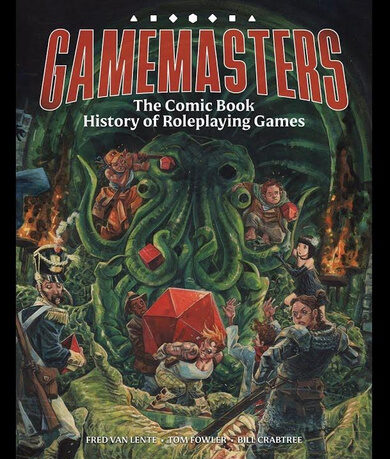We may earn money or products from the companies mentioned in this post.
“You are not your job. You’re not how much money you have in the bank. You’re not the car you drive. You’re not the contents of your wallet. You’re not your fucking khakis.”–Tyler Durden, Fight Club
If Tyler Durden were a GM, he might add that you are not your Charisma, you’re not your Gimmick, you’re not your Light Side Points, you’re not your Cheesemaking Proficiency, even that you’re not your Yum Yums. And I certainly hope that you’re not your fucking equipment list; there’s a special place in gamer Hell for those people.
Anyway, the point is that there’s a lot more to a character than the stuff that’s written on his character sheet. Most modern players will think that’s a pretty obvious statement, and it is as long as we’re talking about stuff that we generally classify as “flavor”: personality, physical appearance, style, and even things like personal relationships and lifestyle to a certain extent. I say “to a certain extent” because at some point we’re used to seeing those last two traits, and ones like them, represented on the character sheet. Sure you don’t need a stat for knowing “little people” or for living in a crappy apartment, but if you want the Governor to be your old college buddy or to be a wealthy jet-setter who lives on a palatial estate, you need a “Contacts” or “Resources” Advantage/Merit/Gimmick/Aspect/Whatever.
Gamers are even more resistant to the idea that a character might have abilities that aren’t listed on the character sheet. That’s a little odd since in most game the core stats (Body, Brain, and Nerve in QAGS; Strength, Moxy, Willpower, Femoral Artery Integrity, and assorted other Words in other systems) at least to some extent are stand-ins for all the abilities that aren’t listed on the character sheet (because listing all would cause mass deforestation). Not having a “Weightlifting” skill doesn’t mean you can’t lift weights, it just means you use your Strength or Body or Muscle or whatever, just like not having a “Contact (Third Grade Teacher)” doesn’t mean you never went to third grade, just that the GM will have to improvise what sorts of rolls are needed (if any) when the player really needs to know something about third grade.
Even though we know on some level that a character sheet isn’t an inventory of skills, most gamers still kind of think of it that way, though the degree varies. Some players, especially newer ones or those who are used to very structured “grocery list” type systems, won’t even try things that aren’t on the character sheet. If they’ve got the “Hammering” Skill, they treat every problem as a nail. While there are definitely some things (Surgery, Rocket Science, Humor) that are best left in the hands of professionals, the reality is that in real life people do things every day that they have no training or experience in doing (Film Making, Web Design, Humor). It’s part of how we learn to do new things. More importantly, at least to my idea of what gaming is all about, characters in fiction regularly try and succeed at doing things they’re not trained for by virtue of the fact that THEY’RE THE GODDAMN HEROES. John McClane has never been a member of the bomb squad, but if somebody puts a bomb in his way you can bet your ass he’ll figure out how to disarm it. Gaming isn’t about what’s realistic, it’s about what makes a good story. John McClane blowing up because he cut the wrong wire doesn’t make a good story. John McClane saving himself and letting innocents die because he doesn’t know which wire to cut makes an even worse story.
Of course, gaming’s most direct roots aren’t in the realm of fiction and storytelling, they’re in the realm of wargaming, which is probably part of the reason we think of the character sheet as an inventory that tells what your character can and can’t do. In chess, each piece can only move in certain ways. Similarly, in early RPGs, each class can only do certain things. Since the first RPGs took place in very specific environments (ie., dungeons) where the range of actions was limited, a system where a character either could or could not take a particular action worked. Many of the early games didn’t even have the now ubiquitous core mechanic for situations without defined rules, which is how we got all those weird “Bend Bars/Lift Gates” sub-stats in older versions of D&D.
Eventually we got out of the dungeon and started to realize that characters could, in fact, do things that were not listed on their sheets. We’re ok with the idea of things like assumed abilities (in GURPS, for example, worlds where most people can’t read have the “Literacy” Advantage, while worlds where most people can read have the “Illiteracy” Disadvantage) and default rolls. When it comes to story/background traits (like the contacts and resources mentioned earlier), lines are a little blurrier. For the most part, the rule is that you only needed mechanics for things that are unusual for the character concept or are a big detriment or advantage, like having fewer limbs than the typical member of your race or being wealthy enough to avoid jail time for piddling little crimes like manslaughter or crashing the world financial system.
When advantages and disadvantages happen as the result of the story, things get weird. There’s always the question of whether they need to be recorded on the character sheet and, if so, how those mechanics should be handled within the advancement system for the game. Should the character have to pay for his magic sword? Should he get a Yum Yums/Fate Points/Karma “refund” for his missing leg? Taken to the extreme, you end up with systems where every aspect of the character has a rule attached to it, to the point where you have to buy the “ranged weapon” ability if you want to use your bow as a missile weapon. Fortunately, most games just give some guidelines and tell the GM and players to use their best judgement.
On the skill/ability end of things, there’s another problem: list escalation. You want characters to grow and learn new things, but if that means adding new skills or feats or whatever, you end up back in grocery list territory. The very concept of removing skills that are no longer relevant is a hard one to swallow despite the fact that we accept that some former (ie, before the game started) skills probably aren’t listed. Even if the character sheet isn’t an inventory, we still think of it as at least a running record of things the character has done/known how to do during the game. Taking a skill off the character sheet is like losing something, and that should only happen in very rare cases, like when you turn evil and suddenly forget everything you know about living in the woods. You know, when it makes sense.
The QAGS 2E experience rules, in all their wonkiness, provide a good example of exactly how ingrained the idea of the character sheet as an inventory of abilities and record of the game is in most gamers’ minds (or at least mine). Most of the weirdness of that system comes from trying to allow characters to improve and change and learn new things without the character sheets of experienced characters becoming multi-page lists of abilities. While the current experience system works fine for what it is, I’ve come to realize that it (and most experience systems I’m familiar with) is based on a flawed premise, namely that the character sheet is some kind of dossier or journal. To fix things, we’ve got to change our whole idea of how we think of character sheets. As you might have guessed from the long path I took to that conclusion, I have a few ideas on the subject. Come back next week and I’ll tell you all about them.





